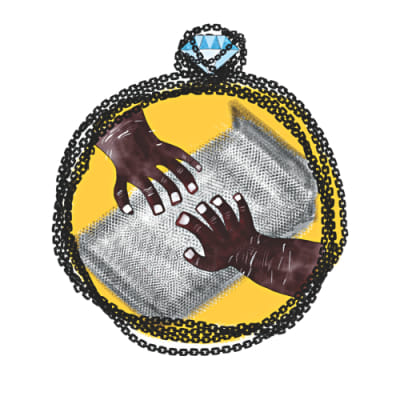Is marriage a license to rape?

Last year, 24-year-old Otoshi* divorced her husband because she had an unhappy and abusive conjugal life. Even today, she hasn’t been able to share the actual reason behind her divorce with her family members, except with her mother. The rest of her family and relatives blame her for failing to lead a domestic life with her well-off husband with a government job.
We live in a society where talking about rape is difficult enough as it is. But the concept of a man raping his own wife is inconceivable. If women ever want to speak up about it, we stop them and make fun of them, demanding, “Is there even a thing called ‘rape’ in a marriage?”
However, marital rape is a chronic form of violence which takes place within a marriage, where the spouse forces, threatens, or intimidates their partner to meet their sexual demands, without bothering to take consent. In Bangladesh, the victim is usually the wife. Although recognising and criminalising marital rape came under scrutiny worldwide in the late 20th century, in Bangladesh, neither the law nor public opinion recognise non-consensual sex within marriage to be a crime. Bangladesh is one of the 36 countries in the world where marital rape is still legal. Here, patriarchy remains deep-rooted and many men do not find it necessary to take their wives’ consent; they take it for granted. Meanwhile, women feel compelled to “please” their spouses as a duty of married life. When they cannot, they believe that the fault lies in them.
Otoshi’s ex-husband would come to the village once in a month or two. But instead of being a special time for her, his visits proved to be quite the opposite. “He forced himself on me from the very first night. It was an arranged marriage and I knew very little about him. My wedding night was meant to be one of my most memorable nights, but instead it was a nightmare,” she shares. “The next day, I was unable to walk properly at my bou-bhaat (wedding reception) ceremony, but I couldn’t share anything with anyone.”
The next few days were even worse. Otoshi soon realised that her husband was only interested in having a physical relationship with her to fulfill his desires; he did not have any respect for her as a person. If Otoshi refused to comply, the man used vulgar language. “For example, during my periods, I was not comfortable about participating in sex, but he forced himself on me nevertheless,” she states, to describe how she could not make any choice about her body.

Meanwhile, her in-laws soon caught on that something was wrong between the newly married couple, as they would quarrel often. “My mother-in-law always blamed me for being unable to ‘please’ their son. She would complain that her son comes home only for a few days at a time—if I could not make him happy then, how could we spend our whole life together?” says Otoshi.
These words triggered her to make a decision. She couldn’t stay with that man her whole life. But she couldn’t go back home, because her parents didn’t want her divorce to tarnish their social image. And that’s how Otoshi ended up working as a receptionist in a private company.
In Otoshi’s words, her marriage was intolerable. But even she is not familiar with the term “marital/spousal rape”. She doesn’t even believe that there is something called rape in a marriage. She says she only fled and divorced the man because she was unable to “please” his sexual desires.
Marital rape isn’t only common in outwardly abusive marriages. Reema Rahman*, a young professional who married her boyfriend after seven years of relationship, informs us that her husband never seeks her consent before intercourse. “My office closes at 9 pm. By the time I reach home, after working for more than 10 hours, I feel too tired and sleepy for sex. But my husband becomes desperate. He is also addicted to porn and expects me to act like porn stars during intercourse. Even if I am exhausted, I am bound to meet his demands because I’ve realised that complaining about this only harms our relationship,” Rahman explains.
A 2019 study conducted by BRAC’s Advocacy for Social Change department found that marital rape is one of the least understood forms of violence against women. Only four percent of the 4,800 people surveyed across all 64 districts of the country consider spousal rape to be a form of violence. On the other hand, more than 40 percent of respondents considered physical abuse to be the only form of violence against women, while over 54 percent didn’t consider verbal abuse by husbands as violence.
According to Khaleda Khanom, team leader at Ain o Salish Kendra (ASK) for the project “ASTHA: Strengthening Access to Multi-sectoral Public Services for Gender-based Violence Survivors in Bangladesh” supported by UNFPA, the gender-based violence survivors she works with have less awareness of marital rape. “When they come to us to report physical violence or other issues such as alimony or extramarital affair of their husbands, they hardly talk about the forceful sexual intercourse in their conjugal life. They don’t even see it as a problem. Many consider it as a right of their husbands,” she adds. Khanom has been working in four districts with particularly high gender-based violence rates—Jamalpur, Patuakhali, Bogura, and Cox’s Bazar.
To truly understand the breadth of the problem, this correspondent accompanied Khanom to Kalapara upazila of Patuakhali, and conducted numerous interviews with both men and women from that region. And their responses were eye-opening. Seeking consent for sex is just not something that their husbands do. The wives are treated as their husbands’ (read: ‘protectors’) property. Even if they’re physically unable to or are ill—they can do nothing about it. Being a sensitive matter, the women cannot talk to anyone about it, and there is no platform for them to seek help. The most they can do is talk to other women facing the same situation at home. Although ASTHA caseworkers conduct regular couple sessions and courtyard meetings to educate people about different forms of gender-based violence, women sometimes share their opinions on this separately. According to an ASTHA caseworker at ASK, women frequently approach her about their painful conjugal lives.
“I remember one woman who had a uterus ailment, so intercourse was excruciating for her. Her husband would not take her to a doctor because he didn’t want anybody examining his wife. But he still wanted to have sex every day, even if she was completely unable to respond. He blamed her for not cooperating and ruining their relationship,” says Sabita Rani* from Nilganj union of Kalapara. “This woman would ask for ways to be ‘cured’ and meet her husband’s sexual demands in order to protect her marriage.”
Speaking to Star Weekend, some men of Nilganj Union Parishad area admit that they didn’t know about consent in marital relations. They wanted their wives ready, whenever they wanted.
“Sometimes my wife does not enjoy or is not willing to have intercourse after completing all the household chores, but I never thought it can be rape,” says Mobarak Hossain*. “I will try to be careful from now on.”
Rights activists have long been advocating against marital rape and women are now more aware of their rights than before. However, criminalising marital rape still has a long way to go in a society where emotional violence is not considered a form of violence by many. Section 375 of the Penal Code does not recognise sexual intercourse forced by a man onto his own wife as rape, unless she is under 13 years of age. Therefore, husbands have no legal obligation to take their wives’ consent.
Section 376 also mentions that if a man rapes his own wife, who is under 12 years, the man will be punished for up to two years or fined or both. Under section three of the Domestic Violence Act 2010, if the wife wants, she can take legal steps against her husband. As per chapter two of the Domestic Violence Act, it counts as physical, mental, and psychological abuse if a husband forces his wife into a physical relationship and in the process, causes harm or danger to life, limb, or health, or impairs the development of the victim. This includes assault, criminal intimidation and criminal force, controlling behaviour such as restrictions on mobility, communication, or self-expression. Marital rape is not specifically acknowledged here, but it can still help a woman can seek remedy for her sufferings. It is high time that a more specific law acknowledging marital rape is introduced.
The exemption of marital rape from the definition of rape in law was introduced in the colonial-era Penal Code of 1860. Interestingly, UK itself overturned the exemption of marital rape in its criminal code in 1991, as women rights groups protested the notion that men were entitled to their partner’s bodies—but the laws they introduce in our region, still live on. As of 2019, 150 countries have declared marital rape as illegal.
But sadly, criminalisation of marital rape is still a distant dream for Bangladesh as the government is reluctant to illegalise this form of violence. According to Sheepa Hafiza, executive director of ASK, who has been advocating for criminalising marital rape, the government accepted 178 of the 251 recommendations it received from other UN member state during the third Universal Periodic Review (UPR) held in 2018—but criminalisation of marital rape was not one of them. “Although criminalising marital rape was one of these recommendations, the government refused to accept it, as according to them, ‘our legal system does not acknowledge this yet’,” says Hafiza.
*Respondents’ names have been changed to protect their privacy.

 For all latest news, follow The Daily Star's Google News channel.
For all latest news, follow The Daily Star's Google News channel. 



Comments